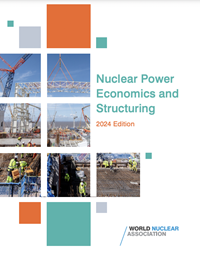Nuclear Power Economics and Structuring 2024 Edition
Economics, Law and Finance Working Group
World Nuclear Association

Nuclear power provides a reliable supply of low-carbon electricity, and it is widely recognized that its role will need to grow to reduce carbon dioxide emissions to mitigate climate change. Not only has it been demonstrated to have the lowest carbon and accident impacts compared to any other energy technology, but it also provides a major economic and employment boost while fulfilling key United Nations Sustainable Development Goals. Similar to the oil shocks in the 1970s, the energy crisis in the 2020s confirmed that the volatility of fossil fuel prices is detrimental to economies while nuclear energy is largely independent of such events. Since the publication of the previous edition of this report in 2017 there have been several developments affecting the economics and prospects of the energy sector. In the former edition, the levelized cost of electricity (LCOE) from nuclear was demonstrated to be competitive when compared with all other sources, in particular the low-carbon ones. It was also shown how nuclear profitability was adversely affected in markets with a growing share of subsidized renewables. Since then, the LCOE from renewables has significantly decreased, but limitations associated with the growth of this sector have also become increasingly clear. Overall, nuclear power not only remains a competitive source of low-carbon generation, but also its environmental and energy security advantages are being increasingly recognized.
Download the PDF.